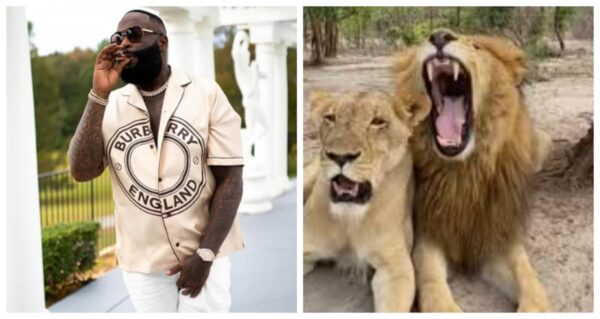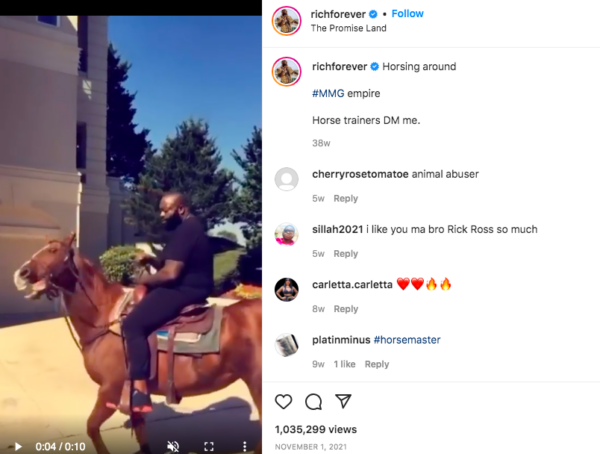Rapper Rick Ross has figured out a way to avoid paying some of the taxes on his lavish $10 million Georgia property. A legislative loophole allows for the multi-platinum artist to receive some financial breaks from his love for domestic and exotic animals.

Originally deemed as his pets, the Maybach Music mogul has accumulated enough of the right kind of animals to boast ownership of a certified wildlife zoo, and possibly classify parts of his Fayetteville Promised Land residence as a farm, according to AfroTech.
Promised Land, the largest single-family home in the state of Georgia, is extraordinary on its own. The property sits on 235 acres and has 109 rooms, including 12 bedrooms and 21 bathrooms.

In an interview with financial adviser Rashad Bilal and educator Troy Millings of the “Earn Your Leisure,” Ross explained how his house, 15-passenger private jet, and other properties are all assets to him because he allows them to make money for him. When he is not using them, he rents them out.
An example is Promised Land, which he rented out to Paramount Pictures, New Republic Pictures, Misher Films, and Eddie Murphy Productions to be used as Prince Akeem Joffer’s Zamundan palace in the movie “Coming to America 2.”
“It’s an asset for me. Whereas the guy who makes a move only once or twice a month. For him, it’d be a liability,” Ross said.
“The homie that owned this [estate] before me made $50 million a night. $550,000,000 plus came through his hands. What’s going to separate me from the mistakes homie made?” he said, referring to former heavyweight boxing champion Evander Holyfield. “I began going down my mental list, ‘Well here’s what I’m going to do different.’”
What’s different is the “confetti,” a slang term he uses for his passive income streams.
Also called “z-z-z money,” Ross enjoys confetti in other places of his business portfolio like his over two dozen partnerships and business ventures, including his 25 Wingstop locations, a few Checkers and Rally’s restaurants, and partnerships with spirits brands Luc Belaire and Bumbu.
Now he is figuring out how to make his investment in animals pay off, perhaps exploring the farming and commercial zoo options, where fans can tour his home to see the “pets.” This might be in the works, since certain animals require the owners to have some sort of USDA-licensed enterprise for them to be kept on the property.

Housing four horses, two African lions (both a male and a female), a cow, and a bull, he affectionately calls the animal haven he started building in February of 2022, Promised Land Zoo. At the top of the summer, he expanded this zoo by acquiring two bison — also known as buffalo — from clothing and underwear brand Ethika. The company gifted the pair to the chart-topper, hoping he would be the only one for miles to have these very special bovines.
“We are gifting Ross these buffalo after a conversation at his birthday party back in January,” Darius Burton, director of brand operations at Ethika, said. “I wanted to get him a giraffe, but he wasn’t ready for that commitment, so he said let’s start smaller, like a cow. I said ‘Nah, everyone has cows, I want you to have something nobody in your state has, I’m getting you a buffalo.’”
The cow, bull, and bison all graze in the same fenced area. In order for him to keep the bison, he had to register them with the Georgia Department of Natural Resource Agency, in the Wild Animals/ Exotic division. State law says, “the Department should be consulted before any exotic animals which are not normally domesticated in Georgia are acquired.”
While the floss factor is one of the reasons why Ross purchased the animals, taking to social media to show them off to his 15.5 million followers, he unintentionally stumbled into another boss benefit of domesticating wildlife. The tax cut.
According to the Georgia Agriculture Tax Exemption rule (Chapter 40-29), homeowners can participate in the industry if they do any of the following on their estate: “managing livestock, equine, or poultry; producing or storing feed for use in the production of livestock, including, but not limited to cattle, calves, swine, hogs, goats, sheep, equine, and rabbits.”
By owning some cattle, his female cow and male bull, Ross qualifies for some of the Southern state’s tax breaks.
His two African lions do not fall under Georgia’s Agriculture listing and are considered illegal in the state. They are deemed “inherently dangerous to human beings.” To keep them on his estate, he must have a license, permit, and/or insurance papers for them.
Ross used to have a baby pet tiger; however, animal rights advocates ripped him to shreds on social media, and the artist, whose estimated net worth is $55 million, has never shown the big cat cub again.




